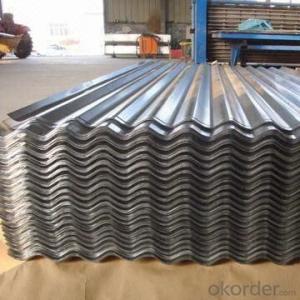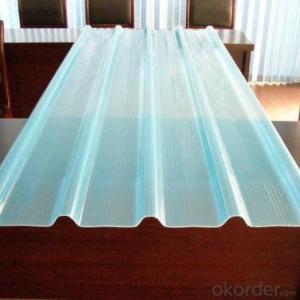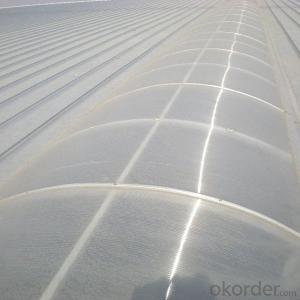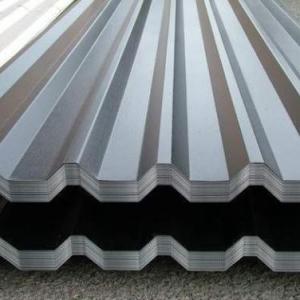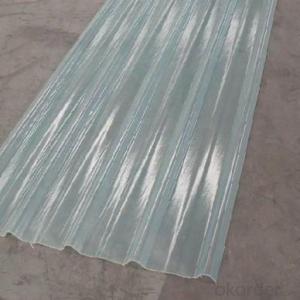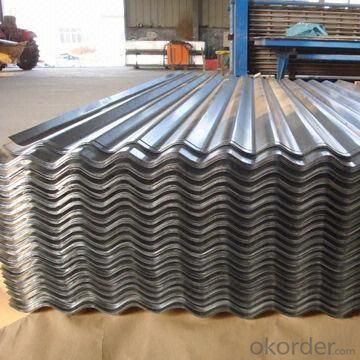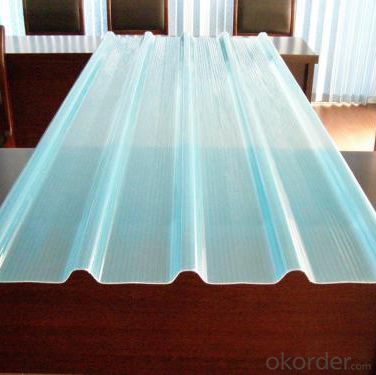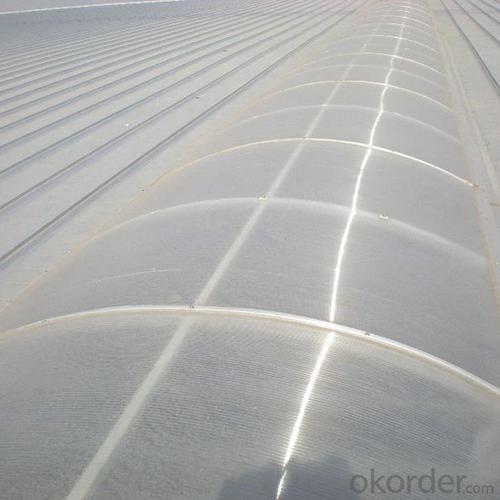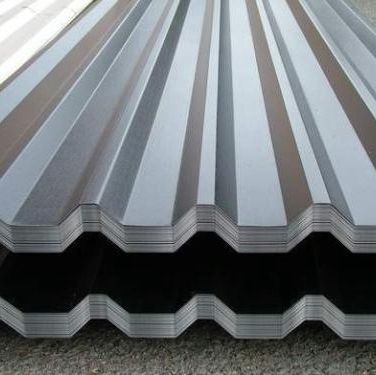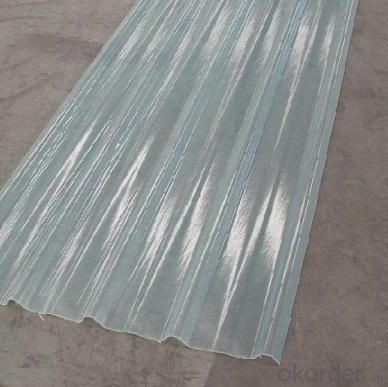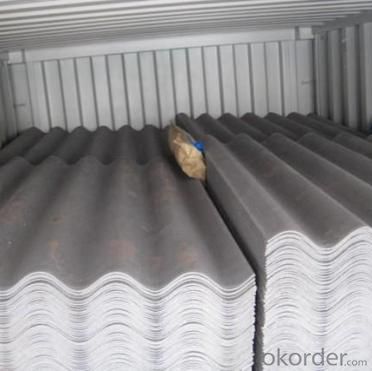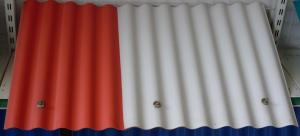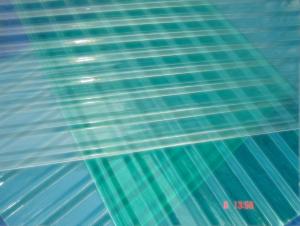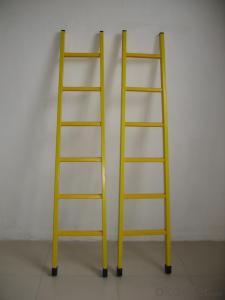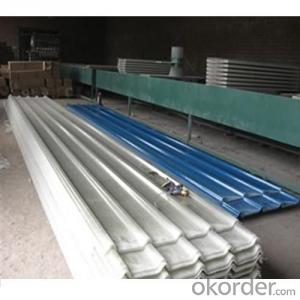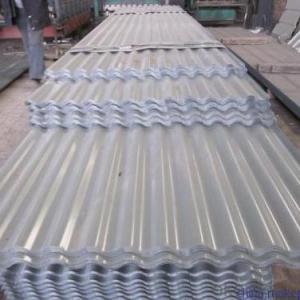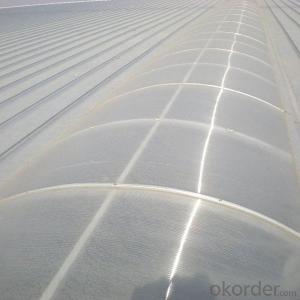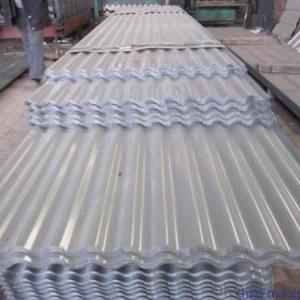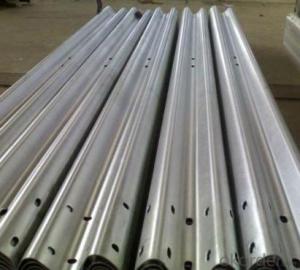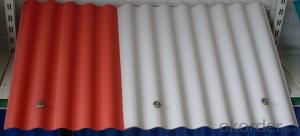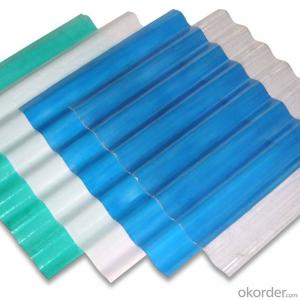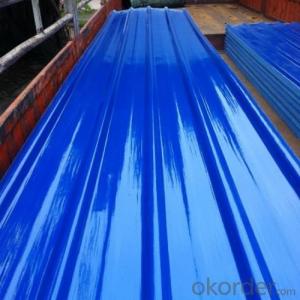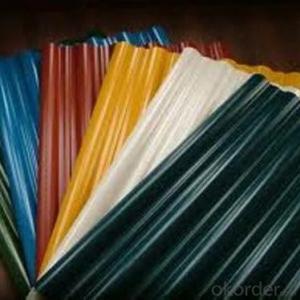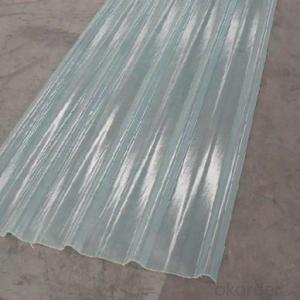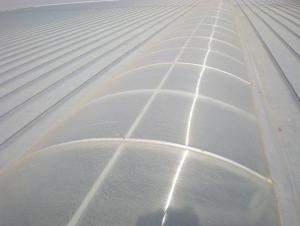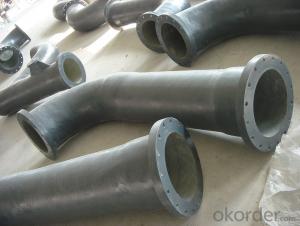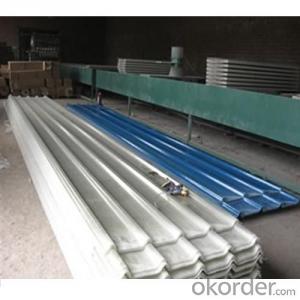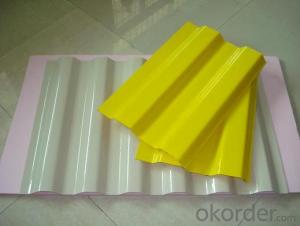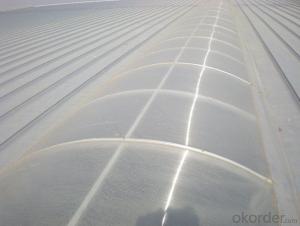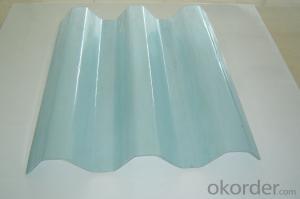High-Quality FRP Roofing Panel - FRP GRP Fiberglass Glassfiber Corrugated Roofing on Sale
- Loading Port:
- Tianjin
- Payment Terms:
- TT OR LC
- Min Order Qty:
- 20 m
- Supply Capability:
- 50000 m/month
OKorder Service Pledge
OKorder Financial Service
You Might Also Like
Specification
PRODUCT DESCRIPTION
FRP GRP Fiberglass Glassfiber Corrugated Roofing is a patent of our company, not like other FRP products, it is produced without yarn, instead, we use mat only. Therefore, the corrugated sheet is more strong in both horizontal and vertical direction.
Fiberglass corrugated sheet is usually used in construction site as protecting facility. It is dagarous for workers in building site since you never know if there is something hard drop down from the high area. So corrugated sheet is installed for preventing the stuff dropping down to hurt people.
Besides, it could also applied as the roof of the constructions.
FEATURES
>> Weatherability: In the temperature range of -40 ℃ - 120 ℃ to maintain stable performance, no high-temperature softening, cold brittle phenomenon;
>> Low thermal conductivity & good insulation performance;
>> Non-toxic, non-asbestos, etc., in line with world health standards;
>> No moss & prevent microbial growth;
>> High impact and resistant to strong wind;
>> Safe and reliable, Not combustion-supporting in open fire;
>> Corrosion resistance, suitable for chemical workshop roof, such as fertilizer plants, electroplating factory
SPECIFICATIONS
Item | Description | ||
Material | FRP, ASA, PVC | ||
Thickness | 1.0mm - 3.0mm | ||
Color | Clear, milk white, blue, green, red | ||
Type | 475, 666, 760, 820, 840, 860, 900, 950, 980, 1050, can be customized | ||
Shelf life | 15 years | ||
PICTURES
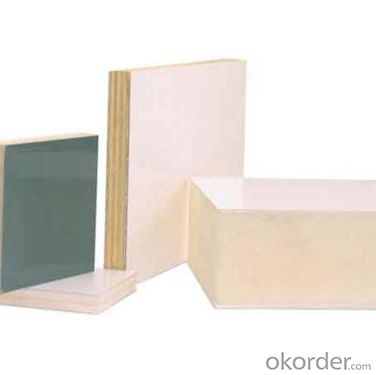
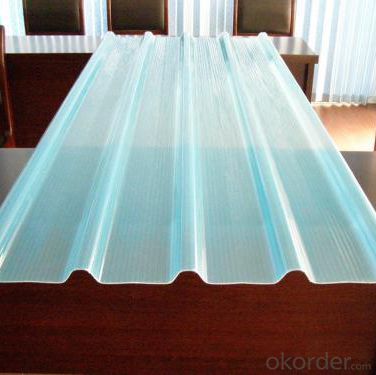
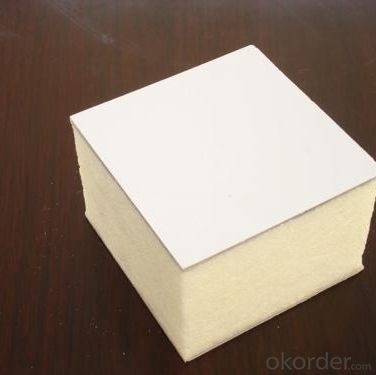
- Q: Are FRP roofing panels resistant to impact from hail or falling tree branches?
- FRP roofing panels, also known as Fiberglass Reinforced Plastic panels, exhibit remarkable resistance to hail and falling tree branches. Their composition, which combines fiberglass and plastic resins, imparts exceptional strength and durability, resulting in their impressive impact resistance. Conventional roofing materials like asphalt shingles or metal sheets can suffer significant damage from hail. However, FRP roofing panels are explicitly engineered to endure such impacts. The robust fiberglass reinforcement effectively absorbs the force of hailstones, preventing them from penetrating the surface and causing leaks or other structural harm. Additionally, the plastic resins employed in the panels confer flexibility, further enhancing their ability to withstand hail impact. Similarly, falling tree branches pose a grave risk to roofing structures. Nevertheless, FRP roofing panels are renowned for their remarkable resistance to impact. They can bear the weight and force of tree branches without cracking or breaking, ensuring the building's protection even during storms or strong winds. Nevertheless, it is crucial to acknowledge that while FRP roofing panels are generally resilient against hail and falling tree branches, exceptionally severe weather conditions or extraordinarily large tree branches may potentially inflict some damage. Therefore, it is always advisable to evaluate the specific requirements of your location and consult with a professional roofing contractor to determine the most suitable roofing solution for your needs.
- Q: Are FRP roofing panels resistant to solvents?
- Generally, solvents do not affect FRP (Fiberglass Reinforced Plastic) roofing panels due to their composition, which combines fiberglass and a plastic resin matrix. The fiberglass provides strength and stability, while the plastic resin offers resistance to various chemicals, including solvents. However, it is important to consider that the resistance of FRP roofing panels to solvents may vary depending on the type and concentration of the solvent used. While most common solvents will not harm FRP panels, aggressive solvents or prolonged exposure to certain chemicals can lead to material degradation or discoloration. To ensure compatibility between the FRP roofing panels and the solvents you plan to use, it is advisable to consult the manufacturer or supplier. They can provide specific information and guidance regarding the panels' resistance to the solvents and chemicals relevant to your application.
- Q: Are FRP roofing panels suitable for university campuses or educational buildings?
- Yes, FRP (Fiberglass Reinforced Plastic) roofing panels are suitable for university campuses or educational buildings. FRP panels offer several advantages that make them a viable option for such structures. Firstly, FRP roofing panels are highly durable and long-lasting. They are resistant to extreme weather conditions, such as hail, snow, and UV radiation, ensuring that the roof remains intact and functional for an extended period. This durability reduces the need for frequent repairs or replacements, making them a cost-effective choice for educational institutions with limited budgets. Additionally, FRP panels are lightweight, making them easier to install and transport. This property is particularly beneficial for large educational buildings, where the installation process can be time-consuming and complex. The lightweight nature of FRP panels also puts less stress on the building's structure, reducing the risk of damage. Furthermore, FRP roofing panels offer excellent thermal insulation properties. They can effectively regulate the temperature inside the building, reducing the reliance on heating or cooling systems. This energy efficiency not only reduces utility costs but also contributes to a more sustainable and eco-friendly campus or educational facility. Another advantage of FRP panels is their versatility in design. They are available in a wide range of colors, shapes, and finishes, allowing architects and designers to create aesthetically pleasing roofs that complement the overall appearance of the campus or educational building. This can enhance the visual appeal of the institution and create a conducive environment for learning. Lastly, FRP panels are low-maintenance. They require minimal upkeep, such as periodic cleaning, to maintain their appearance and functionality. This low-maintenance feature is particularly advantageous for busy university campuses or educational buildings, where staff may not have the time or resources to devote to regular roof maintenance. In conclusion, FRP roofing panels are indeed suitable for university campuses or educational buildings due to their durability, lightweight nature, thermal insulation properties, design versatility, and low-maintenance requirements. These panels can provide long-lasting protection, energy efficiency, and aesthetic appeal, making them a practical and efficient choice for educational institutions.
- Q: Can FRP roofing panels be used for awnings or canopies?
- Yes, FRP (Fiberglass Reinforced Plastic) roofing panels can be used for awnings or canopies. FRP panels are known for their durability, strength, and weather resistance, making them an excellent choice for outdoor applications like awnings and canopies. They are lightweight and easy to install, making them a popular option for both residential and commercial settings. Additionally, FRP panels come in a variety of colors and designs, allowing for customization and aesthetic appeal. Overall, FRP roofing panels provide a reliable and long-lasting solution for awnings and canopies.
- Q: How do FRP roofing panels affect the acoustics of a building?
- The acoustics of a building can be significantly influenced by FRP roofing panels, which are renowned for their exceptional sound absorption properties. These panels effectively absorb and diminish sound waves due to their composition and design, thereby reducing reverberation and echo. This is especially advantageous in environments where noise control is crucial, such as auditoriums, theaters, concert halls, and recording studios. FRP roofing panels contribute to improved speech intelligibility and overall sound quality by minimizing sound reflections. This is particularly important in areas where clear communication is essential, including conference rooms, classrooms, and offices. Furthermore, FRP roofing panels serve as a barrier against external noise sources. Their dense and solid construction helps to block unwanted sounds from the surrounding environment, resulting in a quieter indoor space. Additionally, FRP roofing panels are lightweight and easy to install, making them a versatile option for various architectural designs. Their acoustic benefits, combined with their durability, resistance to moisture, and low maintenance requirements, make them an excellent choice for both new construction projects and renovation endeavors. In conclusion, FRP roofing panels have a significant impact on a building's acoustics by enhancing sound absorption, reducing reverberation, improving speech intelligibility, and blocking external noise. This makes them a valuable addition to any space where acoustic performance is a priority.
- Q: Are FRP roofing panels resistant to chemicals or acids?
- Yes, FRP (Fiberglass Reinforced Plastic) roofing panels are generally resistant to chemicals and acids. FRP panels are made of a combination of fiberglass and resin, which gives them excellent corrosion resistance properties. They can withstand exposure to a wide range of chemicals and acids without deteriorating or experiencing significant damage. This makes FRP roofing panels a suitable choice for industrial or commercial applications where chemical or acid exposure is a concern. However, it is always recommended to check the specific chemical compatibility of FRP panels with the intended substances to ensure optimal performance and longevity.
- Q: Are FRP roofing panels resistant to pests?
- Yes, FRP (Fiberglass Reinforced Plastic) roofing panels are generally resistant to pests. The materials used in FRP panels, such as fiberglass and plastic, are not appealing to pests like insects or rodents. Unlike other roofing materials such as wood or asphalt, FRP panels do not provide a food source or nesting place for pests. Additionally, FRP panels are typically installed in a way that leaves no gaps or openings for pests to enter. However, it is important to note that while FRP panels are resistant to pests, they are not completely immune. In rare cases, certain pests may still cause damage to FRP panels, but overall, they provide a higher level of protection compared to other roofing materials.
- Q: Can FRP roofing panels be installed on wooden frames?
- Yes, FRP (Fiberglass Reinforced Plastic) roofing panels can be installed on wooden frames. In fact, wooden frames are one of the most common types of support structures used for FRP roofing installations. The lightweight and flexible nature of FRP panels makes them suitable for a variety of applications, including residential, commercial, and industrial buildings. When installing FRP roofing panels on wooden frames, it is important to ensure that the frame is structurally sound and can adequately support the weight of the panels. Additionally, proper fastening methods and sealing techniques should be employed to ensure a secure and watertight installation. Overall, FRP roofing panels can be a cost-effective and durable solution for wooden frame structures.
- Q: Are FRP roofing panels compatible with rooftop solar panel installations?
- FRP roofing panels are typically suitable for rooftop solar panel installations. These panels are lightweight, long-lasting, and can be easily installed on different types of roofs. They offer a stable and secure foundation for mounting solar panels. Nevertheless, it is crucial to seek advice from a professional installer or engineer to guarantee that the specific FRP roofing panels used are appropriate for solar panel installations. Factors like weight capacity, structural integrity, and proper roof sealing must be taken into account to achieve a successful and secure installation.
- Q: Can FRP roofing panels be used for canopies?
- Certainly, canopies can utilize FRP (Fiberglass Reinforced Plastic) roofing panels. Renowned for their durability, lightweight properties, and ability to resist corrosion and UV rays, FRP panels are well-suited for outdoor applications like canopies. Moreover, FRP panels come in diverse thicknesses, colors, and translucencies, permitting customization to meet the unique design and aesthetic needs of the canopy. Whether for residential or commercial use, FRP roofing panels offer a robust and enduring solution for canopy construction.
Send your message to us
High-Quality FRP Roofing Panel - FRP GRP Fiberglass Glassfiber Corrugated Roofing on Sale
- Loading Port:
- Tianjin
- Payment Terms:
- TT OR LC
- Min Order Qty:
- 20 m
- Supply Capability:
- 50000 m/month
OKorder Service Pledge
OKorder Financial Service
Similar products
Hot products
Hot Searches
Related keywords
